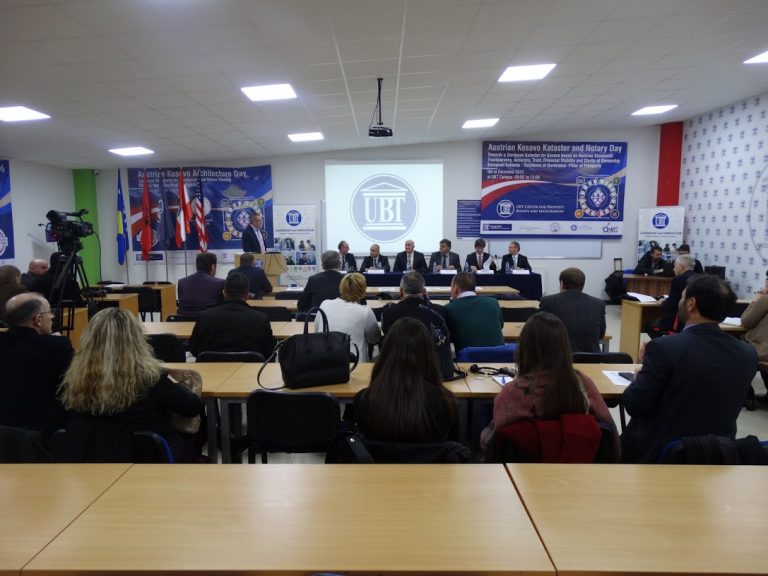
Austrian Experience Appreciated in Solving Cadastre and Notary Problems in Kosovo
09/12/2015Application of the Austrian model of cooperation between the cadastral services, notaries, courts, and tax administrations was one of the focal topics treated today at a conference “Austrian-Kosovar Day of Cadastre and Notary 2015,” organized by the UBT and the Austrian-Kosovar Society.
The conference is part of the events organized by these two institutions with the aim of addressing topics of interest for the state institutions and citizens. In this case, special focus was placed on bringing to Kosovo the Austrian experiences in these specific fields, which could serve as a model for solving a number of problems down the road to building of our state institutions and in particular in terms of adjusting the activities linked to the process of integration into the European Union institutions.
Murat Hoxha, chairman of the Association of Kosovo Geodesists, Dr. Julius Ernts from the Austrian National Cadastral Agency, Alexander Winkler from the Austrian Chamber of Notaries (Österreichische Notariatskammer), Wolfgang Schaffer, head of the BIT Group Austria, Salih Ahmetaj, a cadastre expert, Sokol Halili, mayor of the Viti Municipality, Lulzim Ismaili, deputy governor of the Central Bank of Kosovo, Agron Beka, head of Kosovo’s Social Housing and Property Rights Agency, and other panelists presented their views on this subject front of many participants of the conference.
Presentations of guests from Austria attracted a particular interest of the participants. The Austrian representatives offered a detailed picture of the functioning of notary and geodesy services in Austria, as two intertwined fields. According to them, the model of the work in the institutions that they are part of — the Austrian National Agency of Cadastres, the Austrian Chamber of Notaries, and the BIT Group Austria, which are focused on the digitalization in the field of notary and judiciary in general — could serve as an example to be applied in our country.
Problems of this kind in the Republic of Kosovo, caused by a number of factors and which are still present in the country after all these years since the establishment of the institutions, can be solved by making respective law enforcement institutions functional, but also by relying on the positive international experiences, the experiences of Austria, in the first place, it was said among others at the conference.
Representatives of the Republic of Kosovo detailed the real problems the institutions, both local and central, have been facing on a daily basis in the field of geodesy, cadastral services, notary, and other institutions linked to these services. They noted that the Austrian experience presented at the conference was very much welcome, and they showed their interest in getting assistance from Austria in solving the problems of the institutions, as citizens have been bearing the consequences because of slow actions by the justice institutions but also as a result of accumulated problems in the field of geodesy.